If you’ve had chickens for long, you probably have noticed that they eat all day long. They peck and scratch at the soil and eat every last bit of our kitchen scraps and leftovers.
Letting your chickens free-range, or giving them access to plenty of natural vegetation and/or rotating their grazing parameters, is the key to happy chickens and healthy eggs.
While also being more cost-effective than a diet consisting mostly of store-bought chicken feed, giving your hens a diverse menu of chicken-friendly plants to choose from greatly increases the nutritional benefits of a single egg.
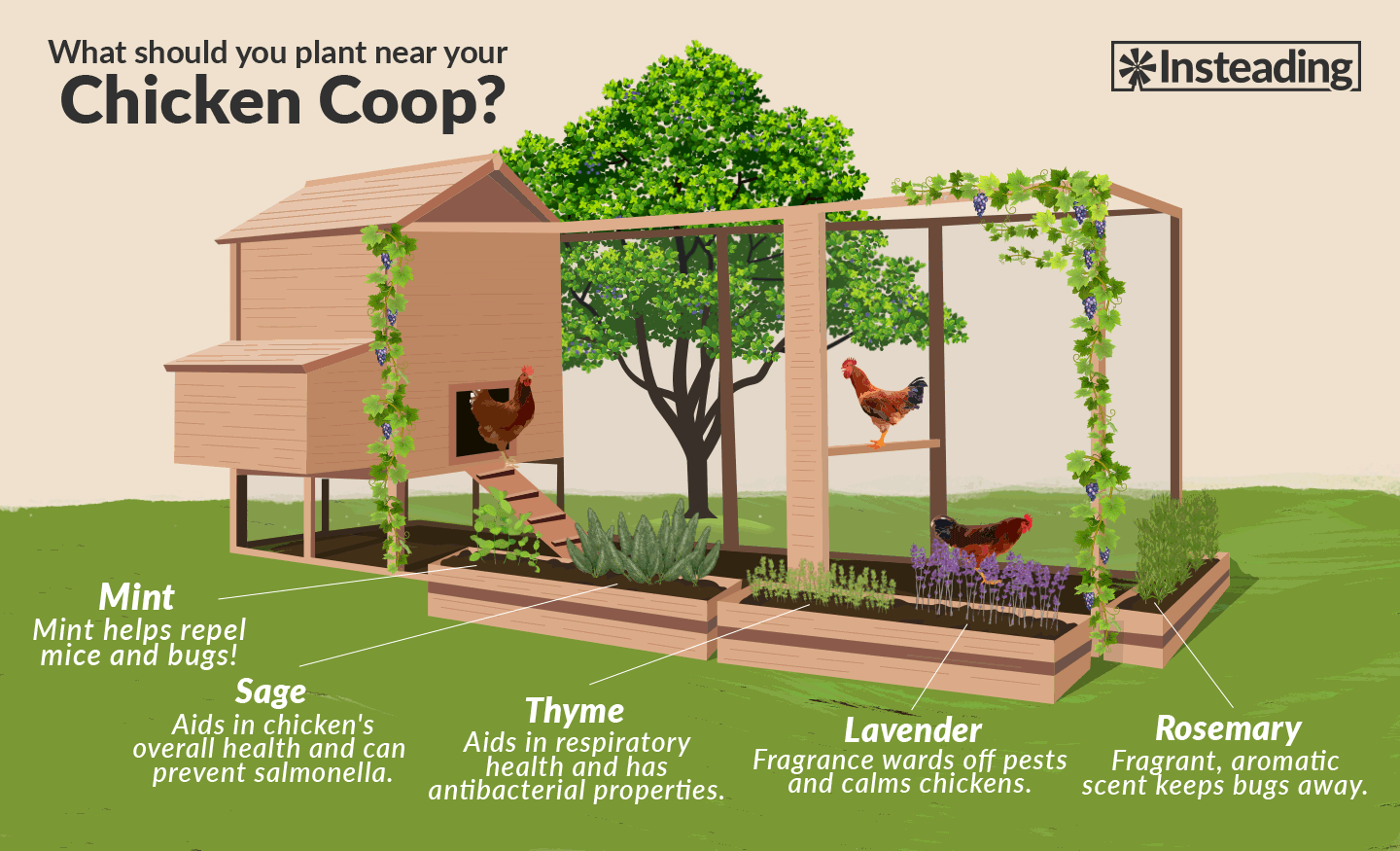
Here on our homestead, we’ve recently reintroduced our hens to having free range of the yard and within a week we noticed a difference in the quality of the eggs they were laying. The shells were thicker, the yolk was brighter, and the eggs were tastier (our chickens were happier too!).
Making sure your chickens are eating nutritiously is just as important as making sure we are eating nutritiously. Giving your flock access to highly nutritious chicken-friendly plants like herbs, veggies, and perennials can be an easy way for you to consume the benefits of the plants as well.
Before we get into highlighting specific chicken-friendly plants individually, here is a full list.
List of Chicken-Friendly Plants:
Fruit, Shrubs, & Small Trees
- Most Fruit Trees & Canes
- Raspberry Bushes
- Blueberry Bushes
- Currants
- Mulberries
- Siberian Pea Shrub
9 Healthy Herbs For Chickens
Having culinary and medicinal herbs right outside your chicken coop provides your chickens with easy access to these chicken-friendly plants, while also making it convenient for you to add oregano or rosemary to your morning omelet.
Here is a list of herbs to plant in or around your chicken coop:
1) Comfrey: Symphytum officinale
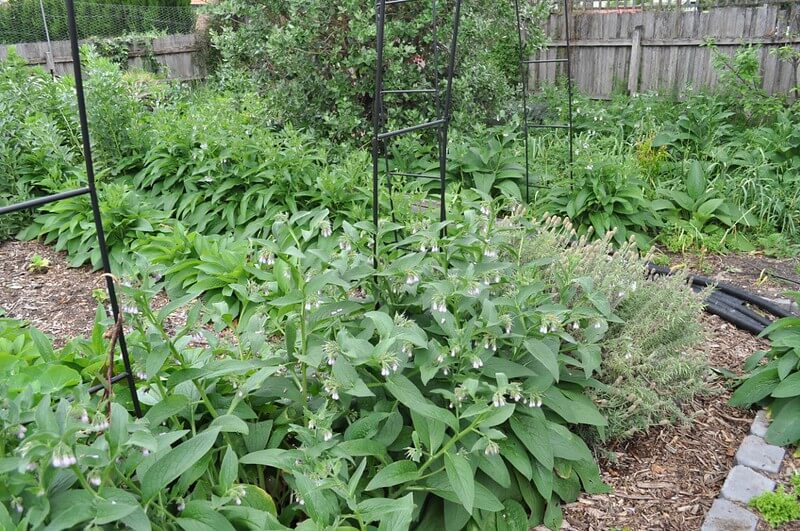
These perennial chicken-friendly plants are rich in protein, potassium, and calcium. Beneficial to chickens for their general health and laying. [Buy]
2) Fennel: Foeniculum vulgare
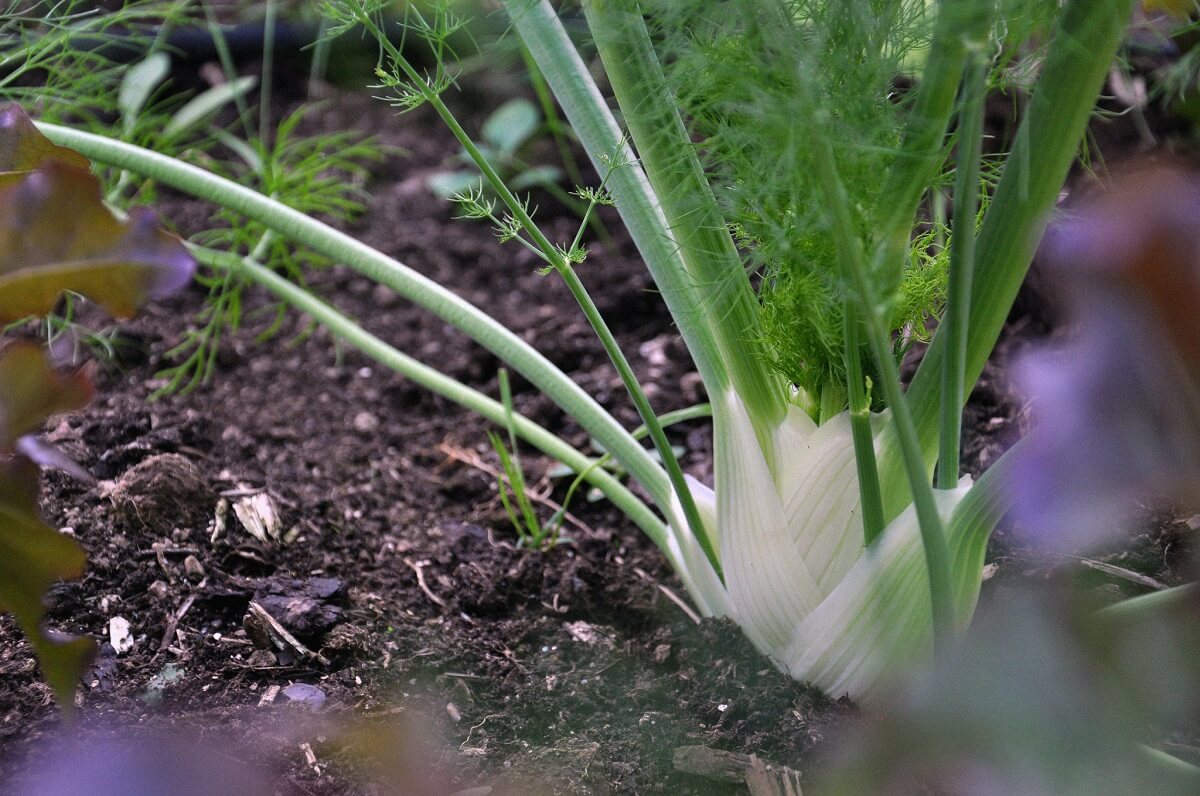
Lacy pods of yellow flowers attract butterfly larvae and beneficial insects for chickens to eat. Their foliage and seeds are also good for general health. [Buy]
3) Thyme: Thymus Vulgaris
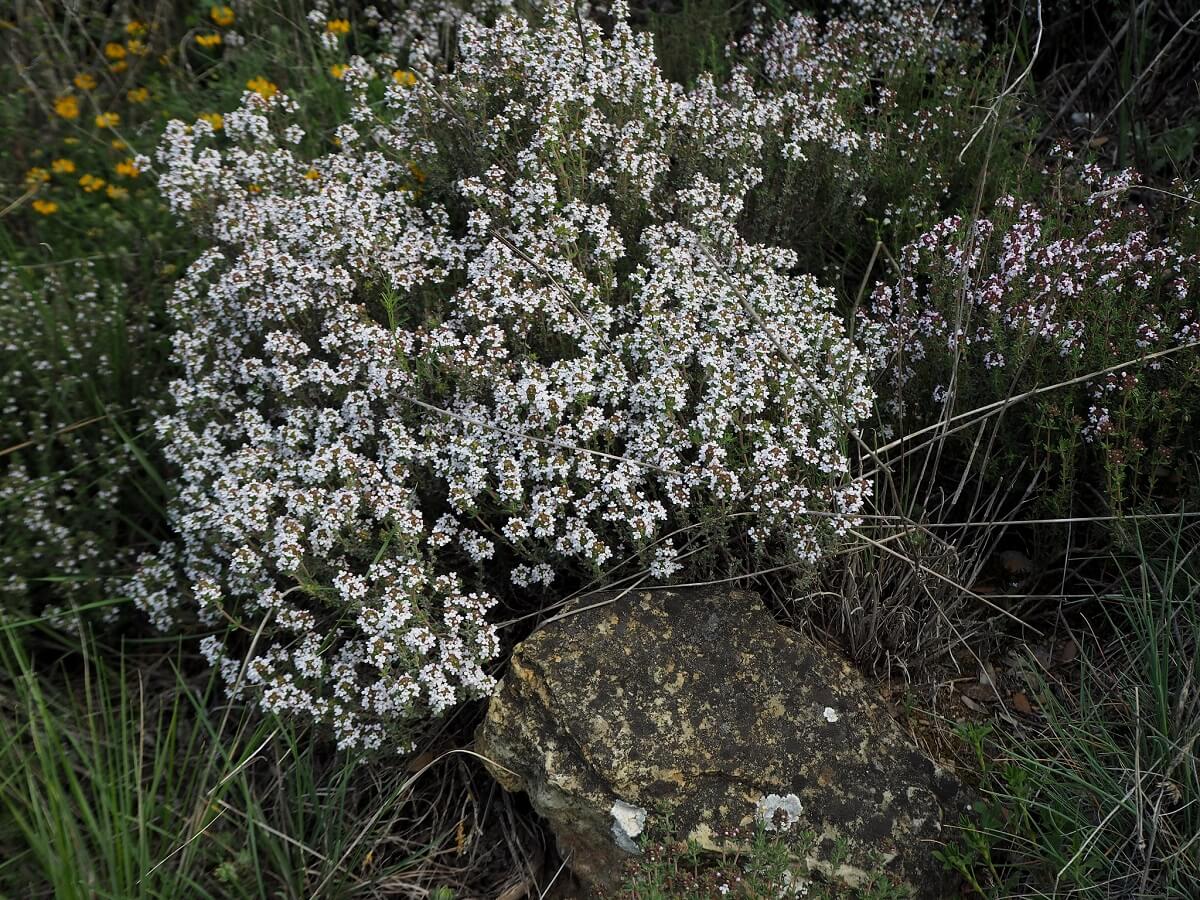
These perennial chicken-friendly plants aids in respiratory health and has antibacterial/antibiotic properties. [Buy]
4) Lavender: Lavandula species
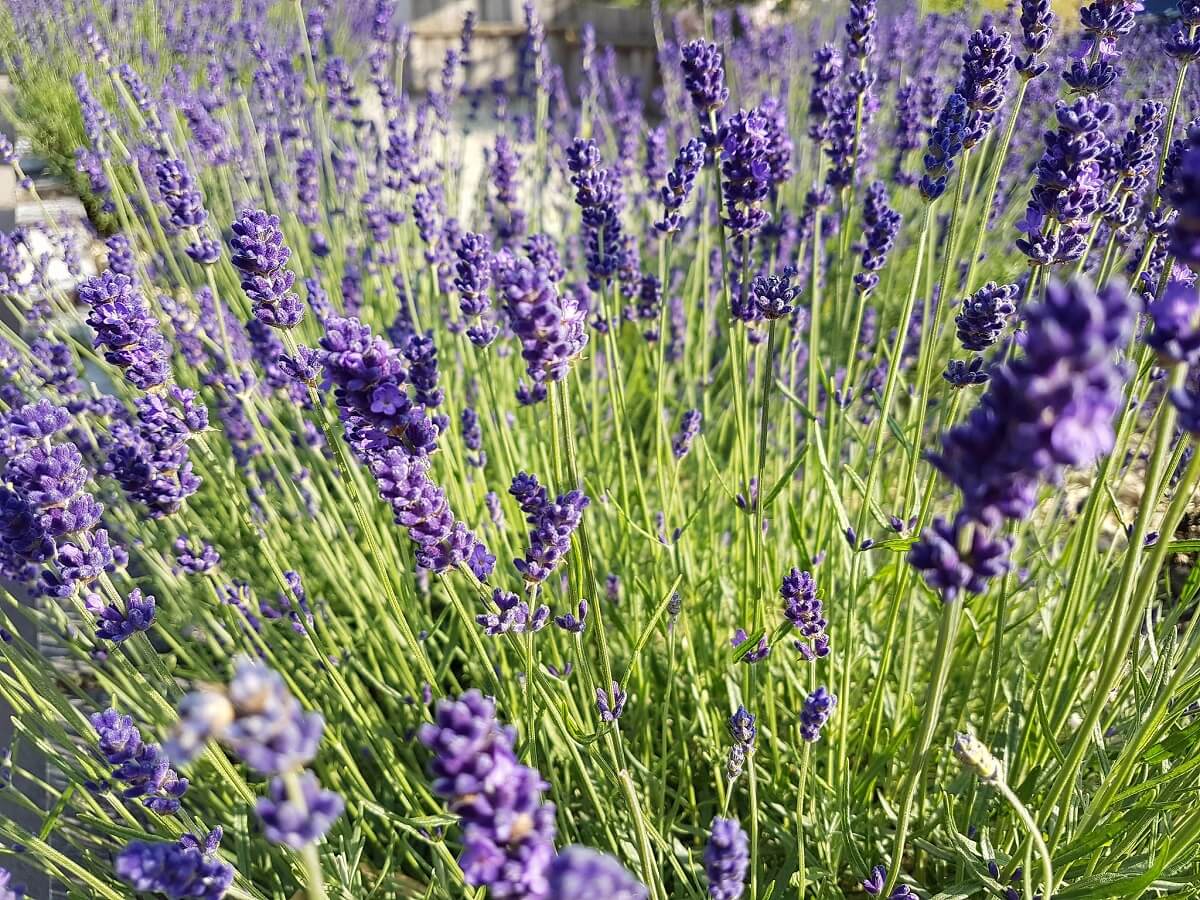
Lavender is a natural insect repellent. Putting dried lavender in your DIY chicken coop or near your chicken run can have calming effects on the chickens as well as being a natural air freshener. [Buy]
5) Nasturtium: Tropaeolum majus
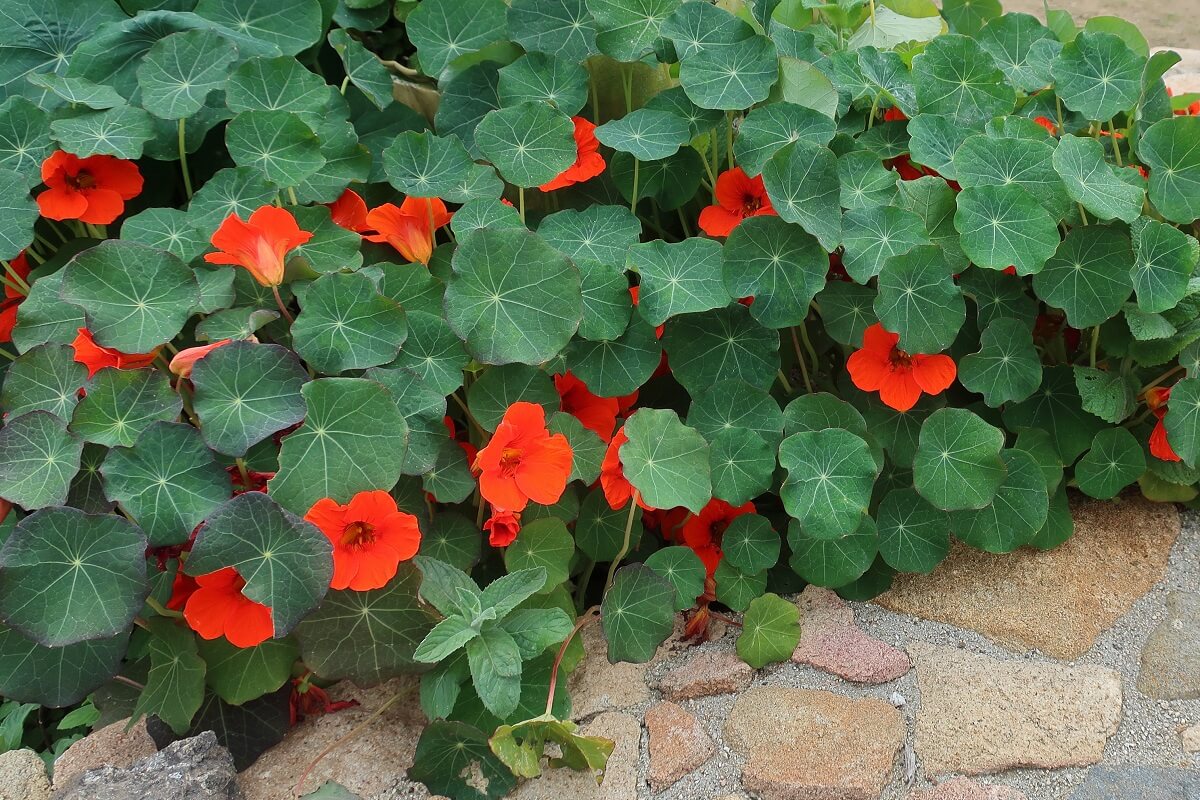
A great general plant for chicken health. It has antiseptic and antibiotic properties. Its seeds can be used as a natural chicken de-wormer. It also has insect repellent qualities. Not to mention, nasturtium flower petals add a bright pop of color to your chicken yard and are edible flowers, too! [Buy]
6) Rosemary: Rosmarinus officinalis

The aromatic scent from these chicken-friendly plants repels insects. [Buy]
7) Sage: Salvia spp
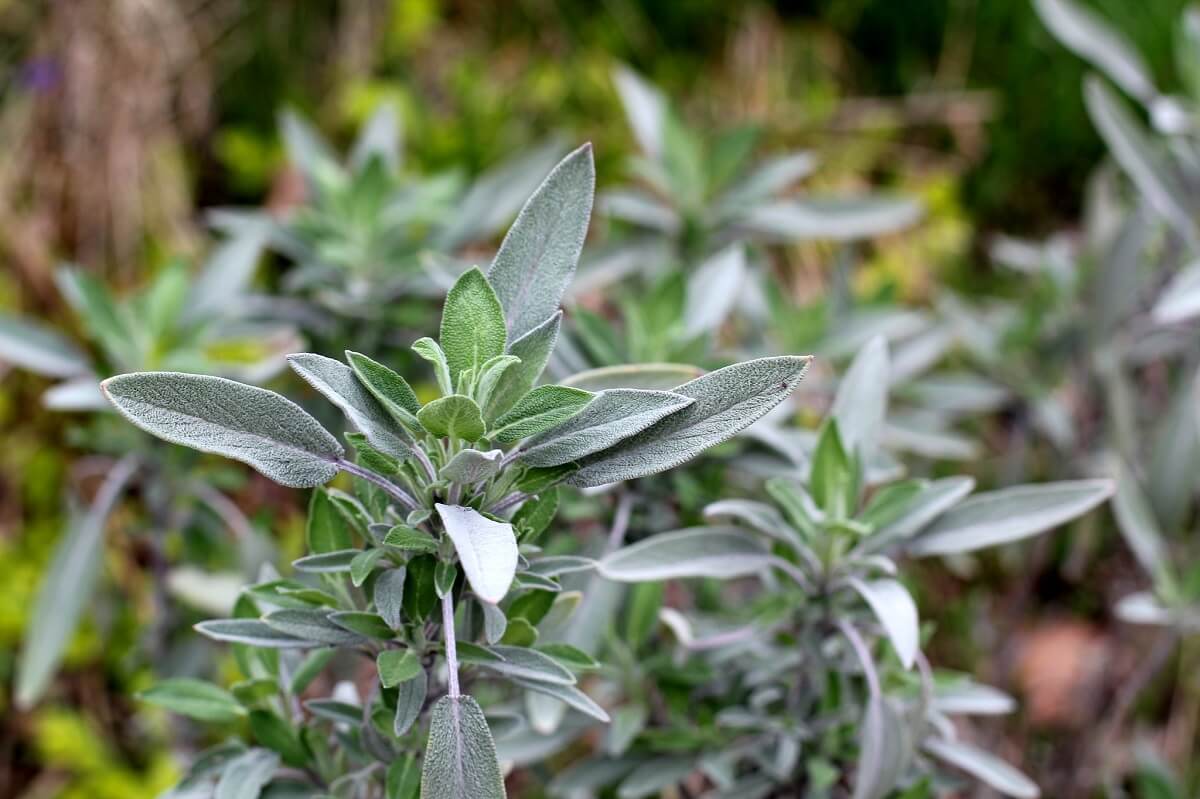
Sage is a good herb for chickens’ general health. Acts as an antioxidant and can help prevent salmonella. Not to mention, this perennial plant smells absolutely lovely and would look nice growing alongside a chicken run. [Buy]
8) Wormwood: Artemisia absinthium

Here’s a chicken-friendly plant that helps control external parasites and is a natural insect repellent. [Buy]
9) Oregano: Origanum vulgare
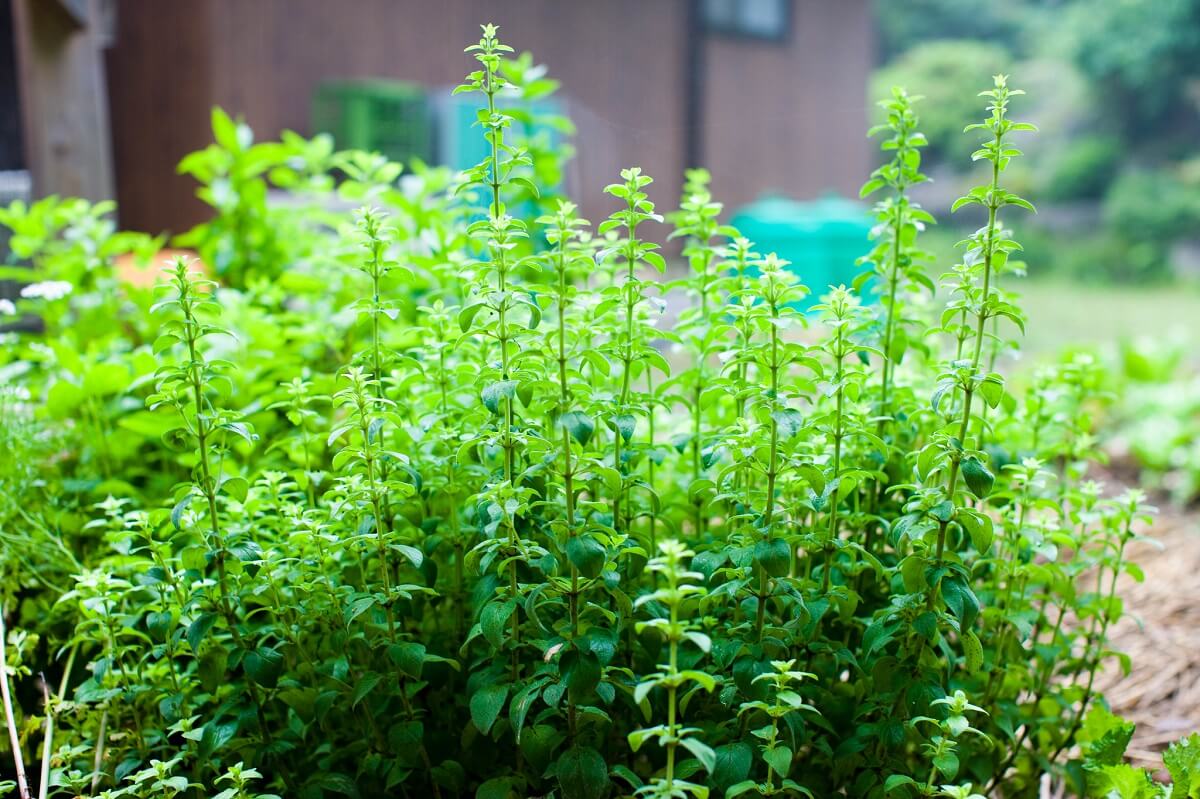
Can boost chickens immune systems and helps fight off e.coli, coccidiosis, salmonella, and avian flu. Oregano is being studied as a natural antibiotic on large scale poultry farms. [Buy]
Related Post: Are There Laws Against Backyard Chickens?
To learn more about keeping your hens healthy with herbs, take a look at An Herb Garden For Chickens by Lisa Steele.
Naturally Growing Food For Chickens
Here are a few more chicken-friendly plants that can be valuable to sow in your chicken area for extra protein and more calories. Many of these plants service multiple purposes in the garden, including cover cropping and soil improvement.
10) Siberian Pea Shrub: Caragana arborescens
This amazing plant is a premier permaculture plant and can be a homesteaders best friend. A perennial in the legume family that is high in protein and is also a nitrogen fixer for the soil.[Buy]
11) Amaranth: Amaranthus hypochondriacus
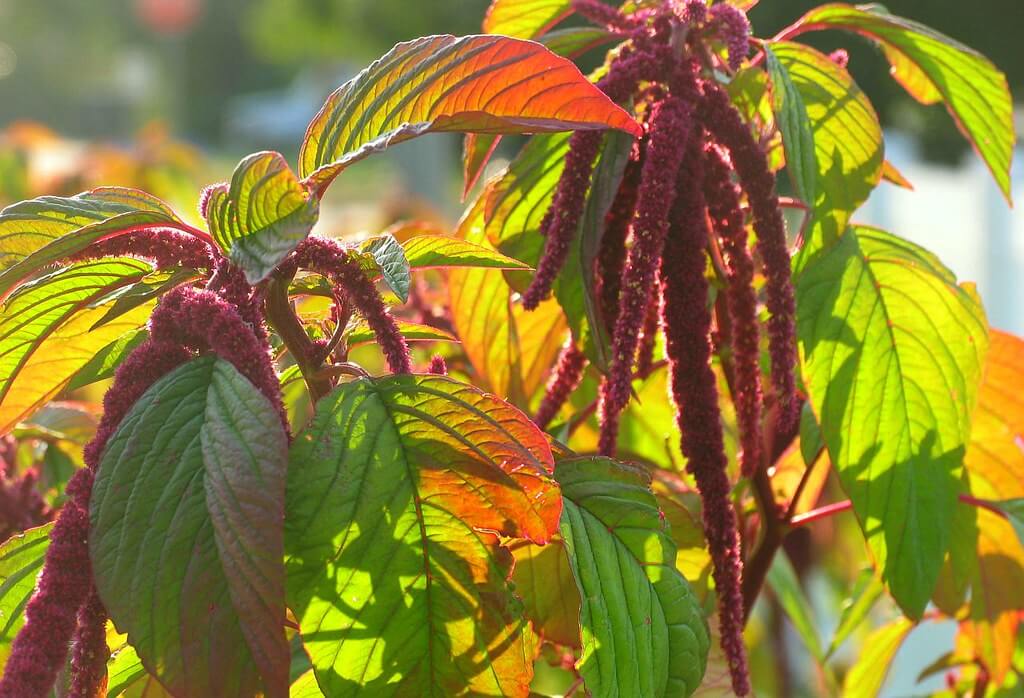
A beautiful addition to any garden, with bright colored seeds and lush broad leaves, your flock will love having a grain supplement in their chicken garden, which is also gorgeous to look at.
12) Plantain: Plantago lanceolata
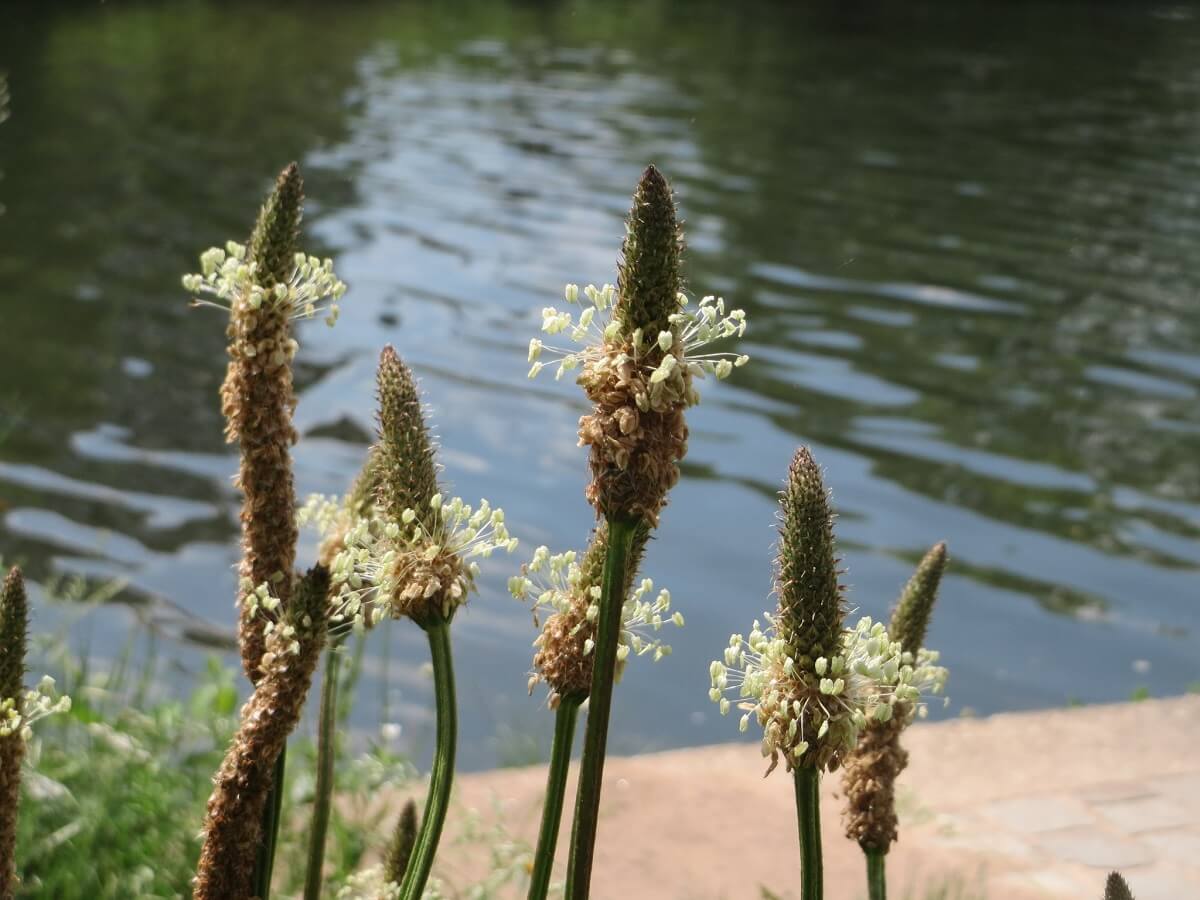
The mature seeds of this plant can used by humans as a natural laxative and as a high protein and mineral source for animals. And your flock with love munching on them in a chicken yard or garden. [Buy]
13) White Clover: Trifolium Repens
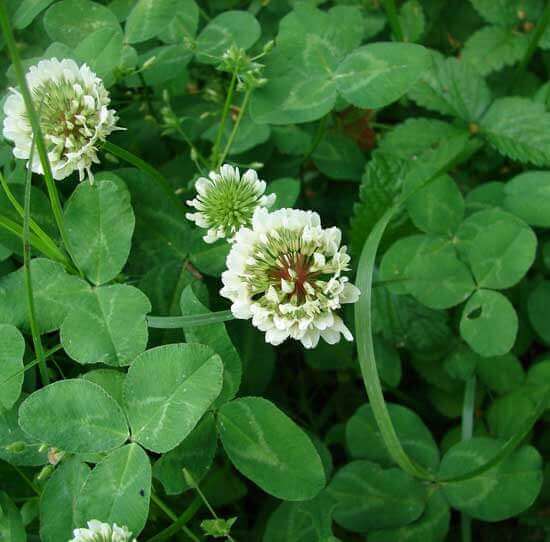
We’ve written about the benefits of white clover as a living mulch in the past. But did you know it’s one of the best chicken-friendly plants, too? Our friend Kevin Fletcher of New Country Organics had this to add:
If you are looking for ground cover to use near chickens I would suggest White Clover. Clover is high in protein but can withstand traffic and stress very well. If you are looking to supplement their feed, Millet and Sunflowers growing beside the coop will provide extra treats. But you’ll have to protect them until they are at least two feet high.
Looking for more ideas? Try more grain-like plants like Clover, Alfalfa, Sunflowers, Peas, Lentils, and Buckwheat. You can also try more fruit trees and canes like Raspberries, Blueberries, and Mulberries. While many people consider them weeds, Chickweed, Dandelions, and Nettles are also decent additions as well. And don’t forget about herbs like mint!
Plants To Avoid Growing Near Chickens
Before you release your chickens into the abundance of your backyard or decide to plant a garden surrounded by chicken wire specifically for your flock, there are a few potentially toxic plants you should know about.
Unlike other livestock animals, chickens have a keen sense of knowing what plants are poisonous and what plants are good for them. Luckily their intuition keeps them away from even trying the poisonous ones, but there are exceptions to everything.
Related Post: What Do Ducks Eat?
If you’re planting near a coop, you’ll want to make sure you’re not growing these plants nearby in case your hens are feeling hungry or pressured to eat something due to proximity (hopefully you have enough natural food to avoid that, of course).
In order to eliminate all chances of accidental toxicity, here is a list of common toxic plants to be aware of:
- Daffodil: Narcissus spp.
- Daphne: Daphne spp.
- Foxglove: Digitalis spp.
- Honeysuckle: Lonicera spp.
- Hydrangea: Hydrangea spp.
- Nightshades: Solanaceae spp. Tomatoes, Potatoes, Eggplant, and other members of the Nightshade family.
- Rhododendron: Rhododendron spp.
- Tulip: Tulipa.
For more information and a full list of potentially poisonous plants visit BackyardChickens.com.
Free-Ranging Your Chickens Offers Additional Diet Variety
In permaculture philosophy, each garden element has multiple functions. An example is bamboo that acts as a windbreak while also providing food, shade, and shelter.
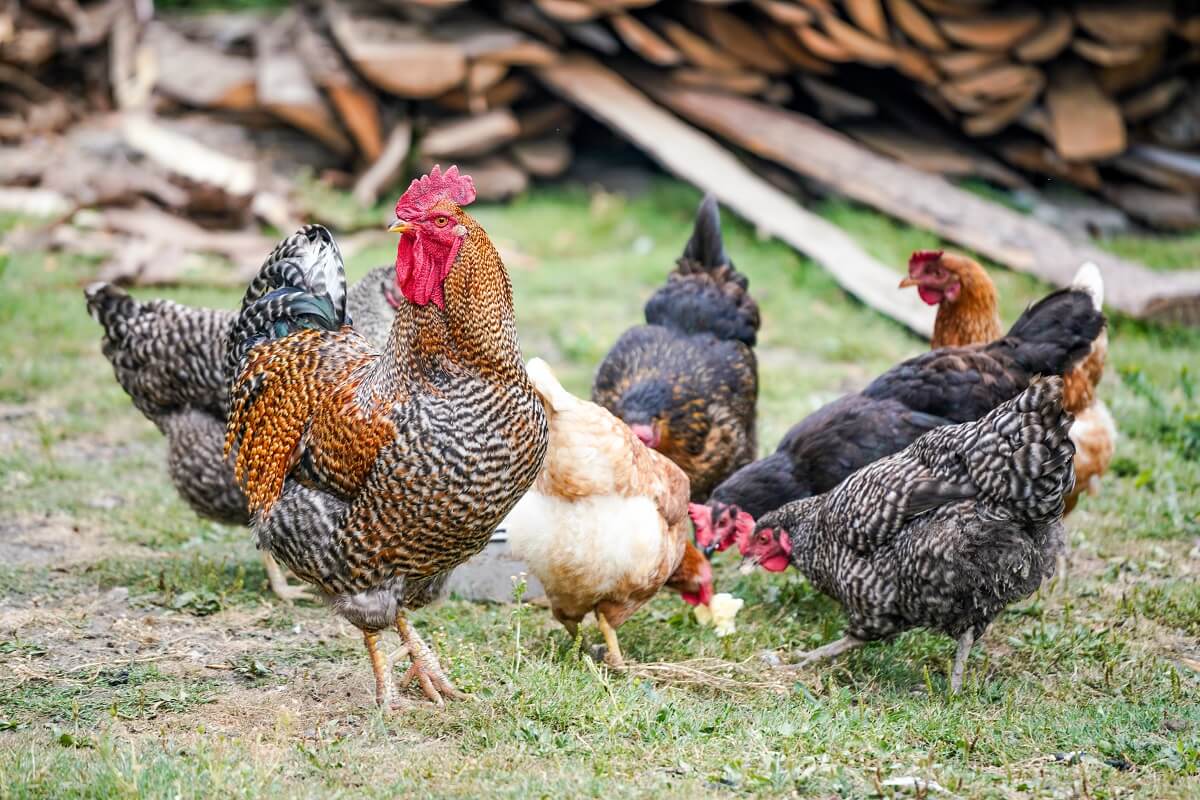
Free-range chickens can also serve multiple functions in the garden, providing your family with more than just eggs or meat. Joel Salatin, known for his revolutionary and holistic methods of raising livestock in a sustainable and regenerative way, gives examples of how chickens can help us accomplish simple tasks in and around the garden.
Debug A Space
Chickens eat bugs at all levels of the bugs life (adult, larval and egg). It’s a good idea to leave your chickens in a space where you have a bug problem and within a few hours you will have a pest-free area and have fed your chickens an abundance of protein-rich food!
Spread Mulch
Place chickens on top of a mulch pile, like wood chips, and they will spread it for you within hours.
Till Soil
Leave chickens in an area long enough and they will till the ground for you. Make sure they have normal feed in addition to what is growing so they’re not forced to eat something that they don’t want to.
Fertilize
Put your flock out in a pasture or soon to be garden space and let them naturally fertilize the soil or grass with chicken manure.
Assist in Composting
Leave chickens on your compost pile and as they scratch it looking for bugs and other food sources, they will be oxygenating the pile. And as they add manure to the pile they will be contributing the necessary nitrogen element to the composting process.
Here’s an awesome post that talks about how chickens can perform multiple functions in the garden and demonstrates the symbiotic relationship of gardening and animal raising.
Do you plant crops near your chickens to provide them with additional feed during the year? What do they love & what works best for you? Leave your comments below and let us know what your favorite chicken-friendly plants are!

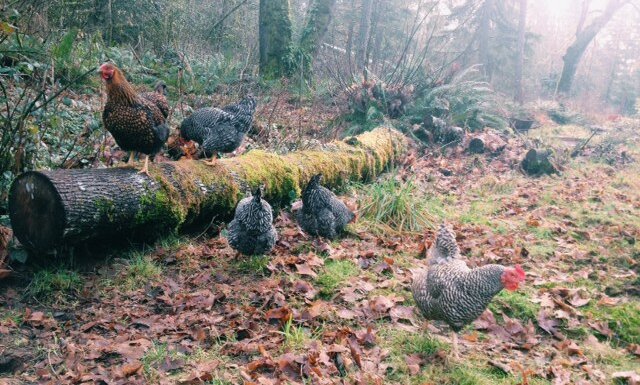
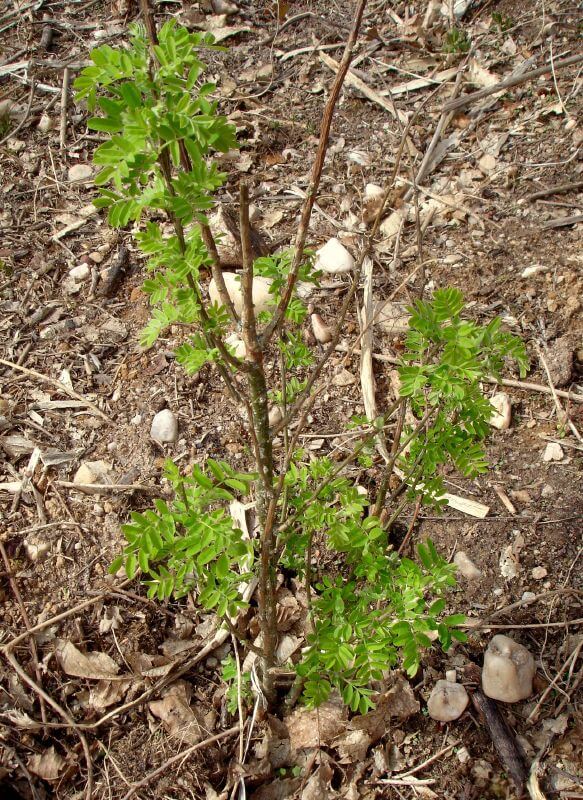

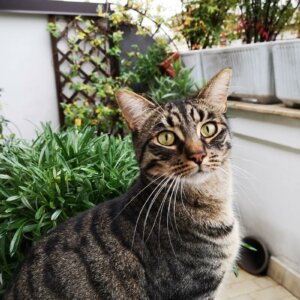
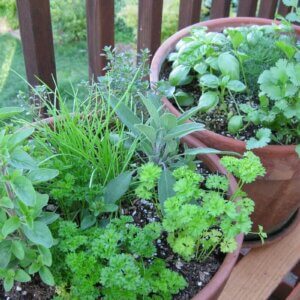
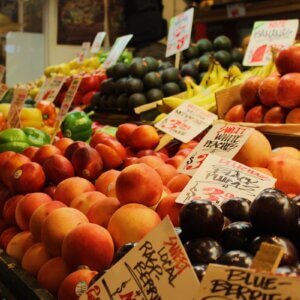

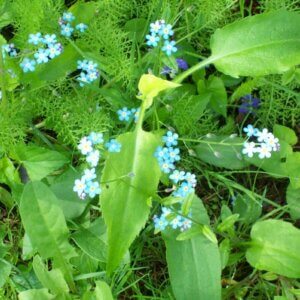

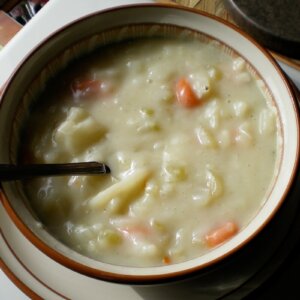
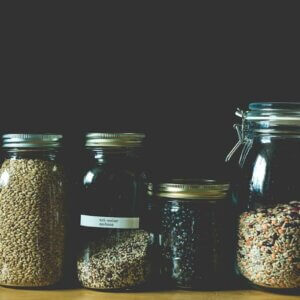







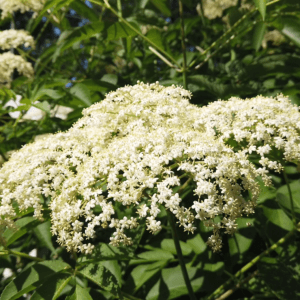


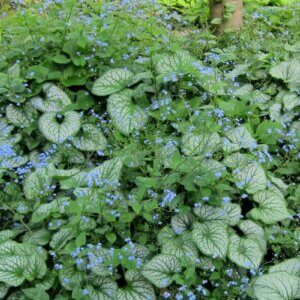
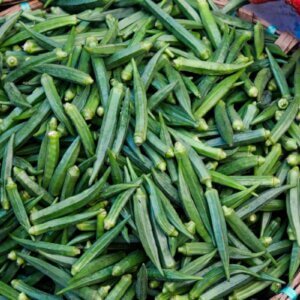


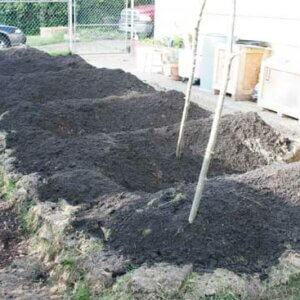
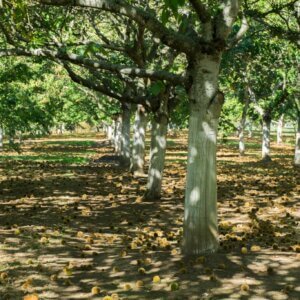



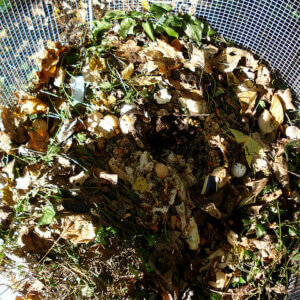
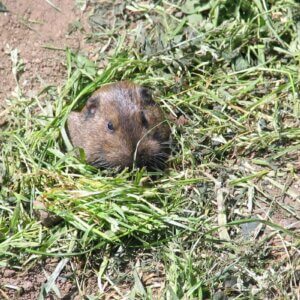
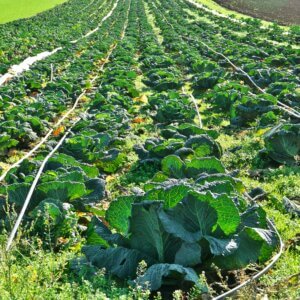
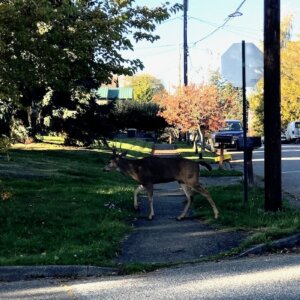
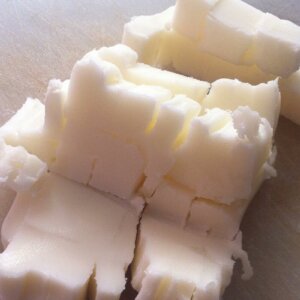
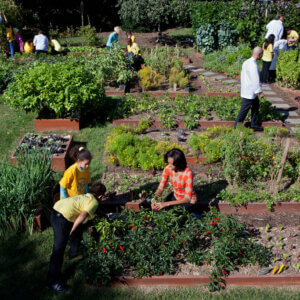

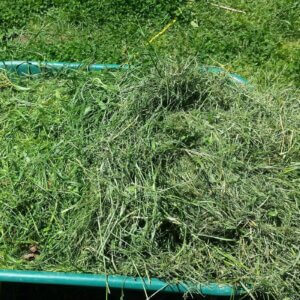
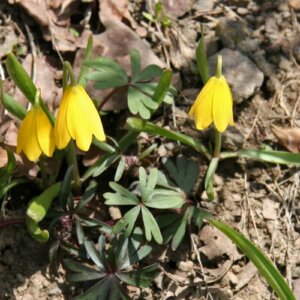
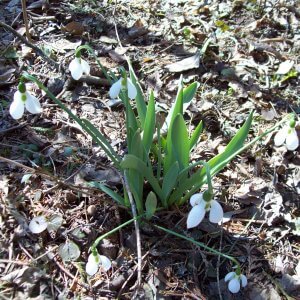


Great info, great writing! :
Hi Marya Casey,
Great thanks for your detailed information.,
I am living in Bolu which is city bewtween Istanbul and Ankara and famous for poultry sector 33 % of Turkey. By the way I am assoc prof working on poultry. poultry science department. I have some books on halal food, natural nutrition and without detrimental i think teher are many suspicious addtives and some alternative life.
Currently, think to establish a project, feddding the laying hens with some aromatic plants, maize and wheat, clean and cold water, some natiral environment for poultry and poultry houses for all groups.. I will observe some special effects, on both animal and eggs laid.
secondly, growing some aromatic plants with my friends at faculty, and bee farming in the fields growing in.
Using essential oils for repellent in bee units,
and now, i am using juniper essential oils using diffuser in hatchery, i am waiting the oil will pass directly from the ppor of the eggs, and some beneficial effects on hatchin, chick quality, antioxidant effect, some histolohical changes, immun system etc
for example , trying of dried olive leaves in feed free range of chicken .. it will probably cause pass of oleropein which is rich in also in olive and cause decrase serum level in human, but never forgor cholesterol is very important and NOBADY can cause decrease in egg cholesterol!, chick needs that cholesterol for embrionic development.
anyway, that is for now,
i want to meet and learn some from you also . Probably you know many things for free range that i i will try soon.
my best
Excellent research…don’t worry about cholesterol. At least the kind you EAT. The only cholesterol to worry about is your own. Made by the liver no matter what it is you eat or if you eat a dozen eggs per day…you will have buildup in your heart arteries. Also, this is highly dependent on genetics. The family history is an excellent example of one’s future. One’s numbers can be perfect; blood pressure, HDL and LDL’S, and all the rest. If one has a family history and genetics that create cholesterol even though it doesn’t show up as being HIGH on one’s blood tests…heck the ONLY way to know is by angiogram.
Wow! Very interesting endeavor! I wish you much success!
Are u on instagram.
I would like to continue questioning u on ur research.
Wonderful info on keeping hens..
I love having chickens on our small farm but must point out that ‘chicken-friendly’ doesn’t mean the plants will survive the attention! As Kevin Fletcher suggested, some plants need to be pretty large/mature to withstand all the scratching and pecking!
Also, in other blogs, some folks have problems with plants that are over-willing to naturalize! I’m thinking of putting sunchokes and comfrey along a fence so the poultry can control them from one side without threatening the other. What do you think?
Thank you so much for the information and time. I appreciate your column. I am a new be to chickens. Get my first babies in May. Can’t wait! But want you to know that I am devouring all your information. Please don’t stop writing. Thanks again Amy
So helpful and informative. Thank you. I’m in hot and windy west Texas. So good to know what plants are safe or unsafe.
chickens do sound useful in helping with growing crops. i am a vegan + averse to taking the life of any development, but realize that chickens do likely enjoy life as myself, could you please inform me on chickens and how to raise them so that they enjoy life to the utmost?
Photo/Attachment:
I am vegan and my advice is to rescue chickens. There are many sanctuaries with chickens who were about to be slaughtered, but rescued by people like you who want to give them their best life. Talking about breeding them so as to eat their eggs put them to work is not ethical. We bred these birds to lay a ridiculous amount of eggs. In the wild, chickens lay only about 3 to 6 times a year. The males are killed. We have to stop taking animals from their natural state, breeding them to unnatural conditions, and then slaughtering them when they are of no use to us any more. Take a look at the MicroSanctuary Movement for more information.
we stopped taking animals from their natural state long ago. nothing goes to waste. we all come from the ground made up of energy. eat nomeat during summer, during winter when not enough greens are available eat what we can get deer chickens and so on. they are not native the north american we dont need to SAVE them. when im out gathering or hunting if im eaten by a bear cougar wolf pack of coyotes or fishing and eaten by a shark i would understand that im part of the food chain. if he needs to feed and im eaten thats life. to be wasteful is whats wrong. chicken lay eggs and get old then you butcher them and eat the chicken. keep the roosters to breed and always have food and keeping ethics is important. treat them nice they will give you want you need. we are all food nothing special, shit dolphins have societies and more advanced communication then we can comprehend. they probably look at us thinking or knowing humans are gunna kill us all. so instead of saving animals from death why dont you try saving humans from themselves
Good info. For warm enough places, Moringa might work – super plant. i’m i a mediterranean zone in N Cal – but it should grow from (mulched) roots every year. Hope i get seeds because they’re about 50% oil – and that oil doesn’t spoil…
More calcium than milk, more protein than yogurt, tons of vitamin A and beta carotene, and lots more
Awesome post! My husband and I are new to raising chickens. Your post has lots of information I have been looking for! Thanks!!!!!!!!!!!!
I know the struggle! I think it is especially hard to keep the yard
looking nice with a dog too… one year we tried really hard to combat the pet damage.
My husband read online that you could ‘rinse’ the area of
the yard where the dog went to the bathroom to help with the ‘nitrogen damage’.
So for the next few months we had a ‘pee watering can’ to pour over our dog’s potty spots.
It sounds so ridiculous to admit LOL! Glad we ended up giving up on that…
not sure what our neighbors thought haha. Good luck with your yard troubles!
Am in Zambia (southern Africa) and I want to buy some seeds to grow for my chickens.Any advice and if possible send me a quotation.western union works well here for money transfer.
Homesteaders need to remember that your free range chickens will range into neighbors yards. Our neighbor with a dozen adult chicken and a hundred half grown chickens let the adults free range. He has an acre of land with no garden. We have six acres and a fair size garden. His chickens are not welcome in our garden, especially when the feast on all the ripe tomatoes. We spent time, money , energy and water to grow these for us, not for his chickens!
Hey Millie, absolutely – that just sounds rude.
I have just built a new chicken coup and have planted in pots 1 passionfruit and 1 butternut plant on 2 corners and will train them over top for shade and fruit/veg for eating when ripe..plant in pots around edge as well…
Can you suggest a climbing Blueberry variety that I can grow next to the chicken coop? I understand that blueberry leaves are poisonous. But are they poisonous to chickens?
I Don’t know about the rest of you, but everything I plant for my chickens is devoured in a few days. I didn’t notice anything about that in your article. Are any of these plants chicken proof. My chickens nice plush area of grass and plants looks like a desert now.Thanks for any info.
I have chickens in a close space and that is my challenge now. I am using above gardening. Buckets within buckets for a watering system due to heat and evaporation here in Florida and the chickens can not dig into the roots that way.
Also I have researched ways to keep them out of places such as spiked netting in the boarders or plants for them within a large coop with wire chicken mesh over a wooden frame over the seedlings for chickens. That way they can peck all they want on the greens accessible to them but not get at the roots to destroy them. It’s their own little garden! And it regrows for them with roots intact!
Yes amen thank you Karen that is how it is here at my house. I guess maybe we should buy our plants larger…maybe 1/2 grown or something. My chickens eat everything down to the grown. But I am still looking for some decent size bushes to plant around my coop…maybe something already grown? See if we can transplant them maybe?
Thank you for the great post and resource. I was wondering what you might recommend as a climbing plant to grow on my coop for shade?
Thank you
Grapes would be a good addition to the outside of the run. The leaves and fruit are edible. My girls LOVE them. If you plant it on the outside, they can’t get to the root or even very much of the fruit, and they grow fast to provide shade.
WE have martins that come in every year and we grow our own gourds. We plant the vines around the chicken pen and gives them great shade and they are easy to grow.
But what about your food? What if they eat everything? Don’t they just eat your whole crop? This is my fear.
Siberian Pea Shrub is an invasive species, please recommend something else.
I keep everything invasive in pots. I have 2 different types of mint i keep in pots it keeps the roots unable to get to the ground or they will take over the yard. i am new to chickens, so this post was great i already grow all of the herbs in pots
on my patio I can just propagate and put around the coop.
I heard that salad vegetables are not safe due to salmonella, what about herbs, or plants for other livestock?
Thanks,
So – this post is focused on plants you can grow next to the chicken coop for the chickens to eat – but it’s probably good to note that we’re not recommending planting those for human consumption. I personally don’t like my chickens having direct access to the vegetables I’m growing for my family for the reasons you mentioned, but also because the chicken manure that falls down is a bit hot for immediate use.
So – I would recommend keeping your personal veggies a reasonable distance away from a chicken coop or run.
This article had the content I was looking for, do they eat mangoes?
I live in Hawaii and my hens LOVE mangoes.
I keep everything invasive in pots. I have 2 different types of mint i keep in pots it keeps the roots unable to get to the ground or they will take over the yard. i am new to chickens, so this post was great i already grow all of the herbs in pots
on my patio I can just propagate and put around the coop.
I see you recommend rhubarb but be careful as the leaves are very toxic.
Helpful post, thank you. Considering planting an arbutus unida (strawberry tree) next to the run for shade. I’ve not seen it listed as any parts toxic or ok for chickens. Can you confirm?
Also, I know beans are bad for them, but people do recommend legumes. So are peas ok?
“… your chickens will love having a grain supplement in the garden, that is also gorgeous to look at.”
Huh?!, who’dda thunk chickens was into aesthetics – ya learns something new, everyday :oÞ
Photo/Attachment:
Hi, we have the blue potatoe bush in full bloom and growing lavishly on the East side of our coops. The chickens love eating from this bush and they are doing judt fine as its an extra addition to their daily rations of pellets.